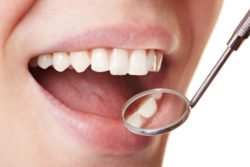 April is Oral Cancer Awareness Month. The Oral Cancer Foundation estimates there are approximately 50,000 new cases of oral cancer every year. Oral cancer can be effectively treated but is often overlooked until the later stages due to a lapse in routine dental care. Many patients dismiss lesions or sores in their mouth as a minor concern and do not report them to their dentist, while other patients avoid the dentist due to monetary issues or fear of the dentist. The truth is, preventative care is the best thing you can do for your health. Dr. Brent Engelberg conducts an oral cancer screening for all of his patients at every routine dental exam at his Arlington Heights, IL dentist office.
April is Oral Cancer Awareness Month. The Oral Cancer Foundation estimates there are approximately 50,000 new cases of oral cancer every year. Oral cancer can be effectively treated but is often overlooked until the later stages due to a lapse in routine dental care. Many patients dismiss lesions or sores in their mouth as a minor concern and do not report them to their dentist, while other patients avoid the dentist due to monetary issues or fear of the dentist. The truth is, preventative care is the best thing you can do for your health. Dr. Brent Engelberg conducts an oral cancer screening for all of his patients at every routine dental exam at his Arlington Heights, IL dentist office.
Oral Cancer Screening
Oral cancer screenings are simple, painless, and quick. Many patients do not even notice Dr. Engelberg checking them for oral cancer. That is really how simple it is. But what takes two minutes to do, could save your life. Oral cancer is most effectively treated when diagnosed early. While visiting the dentist is essential for oral cancer screenings, it is also a good idea to monitor any changes in the tissues in your mouth. If you notice any symptoms of oral cancer that last beyond 14 days, contact AHSmiles to schedule an appointment. While some symptoms of oral cancer may be signs of other oral health concerns, it is best to have them checked out to ensure the possibility of early intervention.
Oral Cancer Risk Factors
While any adult could develop oral cancer, there are genetic and lifestyle factors that could put you at a higher risk of developing oral cancer. If you any of these risk factors apply to you it is especially important to stay alerted to any changes in your oral health and to visit Dr. Engelberg at least twice a year.
- Use tobacco products of any kind
- Exposure to HPV
- Consume alcohol in excess
- Extended sun exposure or UV light exposure
- Family history of oral cancer
- Are over 40 years of age
- Are pregnant or taking birth control
Symptoms of Oral Cancer
Symptoms of oral cancer typically appear inside your mouth on the soft tissue. Oral cancer will often appear in the form of lumps, sores, or ulcers and will persist beyond two weeks. Lesions are usually pale or white, but can also be red or darker in color. Be aware of any white or red patches that develop on the soft oral tissues. Be sure to check behind your wisdom teeth and the underside of your tongue. Sometimes oral cancer can hide in hard to see spots, which is why it is important to maintain your biannual dental check-ups and oral cancer screenings. Oral cancer sores are frequently painless, however, if you do feel a sensitive area or burning, it could be a sign of more advanced oral cancer. Also be sure to note if you have a feeling of something stuck in your throat or hoarseness.
Oral Cancer Risk Factors
Schedule An Oral Cancer Screening
Dr. Brent Engelberg and his highly-skilled team proudly serve patients and their families from Arlington Heights, IL, and all surrounding communities, including; Northbrook, Deerfield, Highland Park, Wilmette, Winnetka, Glencoe, Vernon Hills, Lincolnshire, Libertyville, Skokie, Evanston, Palatine, Schaumburg, Elk Grove Village, Rolling Meadows, and the Northern and Northwest Chicago Suburbs. To learn more, schedule a consultation online, or call our office today at 847-259-8030.
